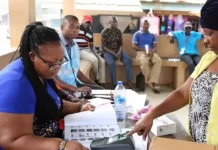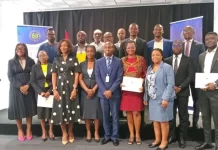
Dr Ekow Spio-Garbrah, Minister for Trade and Industry says Africa could grow more rapidly on the back of its great potential for industrialisation if it could fix its power deficits over the next few years.
A statement issued by Nana Akrasi-Sarpong, Acting Director, Communications/Public Affairs at the Ministry and copied to the Ghana News Agency on Wednesday said, the Trade and Industry Minister was speaking on the topic ”Africa’s Industrialisation Potential in an Energy Deficit Context” at the 3rd Brazil-Africa Forum in Recife, Brazil.
The two-day forum is on the theme; “Challenges and Opportunities for Energy Supply in Brazil and Africa.”
The conference brought together some 200 leading African and Brazilian policy makers, energy sector regulators and producers, financial institutions, academics and researchers, and consultants.
In his remarks to the Forum, Dr Spio-Garbrah cited the vast energy resources of Africa, from oil and gas, to solar, coal, wind, biomass and even sea waves.
He noted that a country such as Ghana begun its post-independence economic development with a full awareness of its energy needs, and built a 500 MW hydroelectric power generator at a time the country needed only 50MW of power.
The feasibility of the hydroelectric project at Akosombo, the Minister said, was however directly linked with industry, as its major off-taker was an aluminium smelting plant, the Volta Aluminum Company, VALCO.
As a result of the construction of this single power generator on the Volta River, the first government of Ghana was able to build more than 300 industries that converted most of Ghana’s raw materials to semi-finished and finished products.
Among the transformational industries Ghana has established over the years were cocoa to chocolates, cotton to garments, cane to sugar, silica to glass, wood to furniture, animal herds to leather products, gold to jewellery, and the canning of fish, fruits and vegetables.
The Trade and Industry Minister recounted how over the years, the connection between power and industry has been lost and as Africa’s populations have grown, power has become appreciated as mainly for residential and commercial use, with the potential for industry to be the off-taker of power being relegated to the background.
Dr Spio-Garbrah noted that nevertheless, most African countries including Ghana recognize the urgent need to revitalize and reinvest in their power and energy sectors and much public and private investment is going into all aspects of these sectors, from generation, to transmission and distribution.
Ghana, he said has today some 2,800MW of installed generation capacity, although for technical, maintenance and operating reasons, often less than 2,000 MW was actually available for consumption.
As a result of these deficiencies common throughout Africa, considerable opportunities remain in the in Ghana and Africa for Brazilian and other investors to invest in a range of power projects across the entire value chain, including especially in biomass and biofuels for which Brazil is world famous.
The Trade and Industry Minister recounted some of the power projects in the pipeline in Ghana and the fact that increasingly industries are building various power generation and heat recovery systems into their production plants, so as to be less dependent on the national grid.
He cited the on-going construction of a government-owned sugar processing plant in Komenda, Ghana, alongside other planned private sugar projects, most of which also planned to produce ethanol.
He invited Brazilian experts to assist Ghana in ensuring the effective management of this new industry.
Dr Spio-Garbrah emphasized that for power to assist Africa to industrialise the needed to be the development of the right policies, the harmonisation of regulations, and the efficiency in the operational management of both power plants and industries.
In addition, both sectors needed creative financing, considerable infrastructure support, as well as the selection of the right technologies and technical standards.
On the sidelines of the Recife forum, the Trade and Industry minister visited a sugar processing factory some two hours away, in order to gain some practical understanding of the operations of such plants.
This, he said, was in preparation for the effective management and oversight of the Komenda Sugar project which is expected to be completed by mid-2016.
The factory visited by the Minister is owned by the Petribu family who have been producing sugar for more than three hundred years. Brazil is the world’s largest exporter of sugar.
Earlier, at the African Global Forum in Dubai, the Trade and Industry Minister had informed some 500 leading Mid-east businessmen and government officials that what Africa needed most was the capacity to transform its raw materials into semi-finished and finished products, so it could curtail the exports of raw commodities which had been its bane for centuries.
He observed that Africa did not lack the necessary raw materials and now also had considerable trained human resources, as well as access to a wide range of capital, from the public and private domestic sectors, as well as to regional and global equity funds, commercial and merchant banks, export credit agencies and other financial intermediaries.
“What seemed to be delaying the rapid industrialisation of Africa was simply the need to bring deals together and to structure them in a way as to make them bankable and sustainable,” he stated.


























